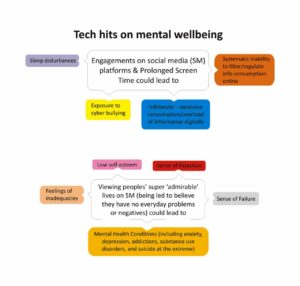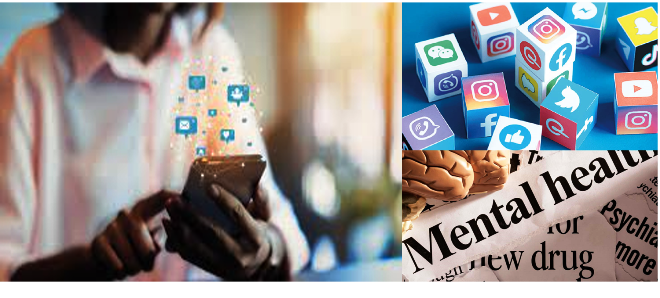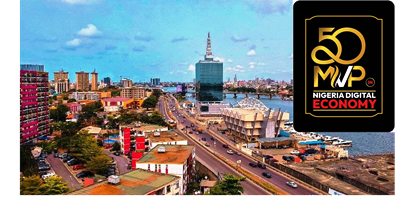By Tracy Yekaghe
More Nigerians will develop mental health issues as digital technology (notably, social media) gains grounds, mental health experts are warning.
RELATED: Why digital technology could worsen mental health conditions – Margaret Uddin-Ojeahere
Experts believe a national awareness on the increasing danger of unregulated exposure to online content or usage of digital tools and conscientious efforts by stakeholders including government to address the looming danger could help.

Internet access is improving rapidly and there are now opportunities to access thousands of apps all of which have very ‘arresting appeal.’ Millions of young people are staying more glued to social media apps spending thousands of hours in a way that both enthrall and exacerbate them with the consequence increase in mental challenges.
No doubt, digital technology is helping in the management of mental health in Nigeria. Most health practitioners including psychiatrists believe access to digital tools have helped to expand the window of managing mental health issues including being able to manage patients from any location through tele-psychiatry, improving the awareness culture around mental health and leveraging certain apps to better address mental health needs.
While many mental health practitioners have become more enabled with digital tools to help patients, there are increasing indices to show that more Nigerians are becoming susceptible to mental health challenges as a result of undue exposure to digital technologies..
Infobesity is impacting mental balance
There are no clear-cut statistics of the degree or nature of mental health breakdown from constant usage of social media platforms or how much of phenomenon such as ‘infobesity,’ an overload of information and systematic inability to filter info-consumption online in order to maintain mental balance, is impacting on millions of young Nigerians perpetually connected to platforms that include Tiktok, Instagram, Facebook and the likes.
According to Statista, “as of January 2023, Nigeria had 31.6 million active social media users. WhatsApp is the most popular platform used in the country, with close to 95 percent of users.” Other popular platforms are Facebook, YouTube, Instagram and Tiktok.
Young people spend thousands of hours on these platforms in a way that challenges both their physical and mental wellbeing.
More apps = sleep disturbances, inadequacies
“It is no longer news that increasing engagement on the different social media platforms and prolonged screen time can lead to negative consequences on people’s mental health in diverse ways such as sleep disturbances, exposure to cyber bullying, viewing people’s glamorous lives on certain apps, especially considering the fact that most people share admirable events or parts of their lives and rarely post the negatives. These can result in feelings of inadequacies, low self-esteem and rejection to mention a few and may lead to mental health conditions such as anxiety, depression, addictions, substance use disorders, and suicide at the extreme,” said Dr. Margaret Uddin-Ojeahere, a psychiatrist and a Fellow of the West African College of Physicians.
Uddin-Ojeahere cautioned on the need for moderation in the use of digital tools.
“There is a need for awareness to help more people stay guided on best usage practices. We also need to understand and be informed about the age limits attached to the usage of certain gadgets which would require the need for supervision and promotion of usage by critical stakeholders such as parents, schools and others where applicable,” said Uddin-Ojeahere, a mental health advocate who also works at the Jos University Teaching Hospital (JUTH).
“An example is cutting down on screen time for instance; not everyone might be aware that blue light from their electronic devices can affect their sleep to the extent of disturbing their sleep cycle and may lead to sleep disorders or forms of mental health conditions,” she added.
Many stakeholders agree with her. Dr. Amupitan Emmanuel Tope who is also a Member of the West African College of Physicians told IT Edge News.Africa that the mental health of the growing population is seriously affected. He is also of the opinion that one of the greatest impact of digital technology is the social isolation that it causes.
Social media and the end of social integration
According to him, families are no longer integrated like the way they used to be. He shared a typical example of husbands talking to their wives without being able to stay off their phones, thereby resulting into little or zero attention given to each other. Many families no longer share close ties like they used to. – he added.
“You can live your whole life on the internet without needing the person that is close to you. This is one of the reasons why we have people coming down with all sorts of mental illnesses that are not picked early,: said Dr. Amupitan Emmanuel Tope who is also a Senior Registrar in the Department of Psychiatry at the Jos University Teaching Hospital.
However, he noted that the fact that digital technology is able to give more users an opportunity to expand their range of impact is an added advantage to mental health.
Jack Roberts, who is a content marketing specialist, shared some best practice regarding digital technology and mental health services on www.nationalhealthexecutive.com where he explicitly stated that The impact of mental health is rapidly increasing, with data showing that nearly one in five adults are diagnosed with a mental illness in their lifetime, and only half of these people receive treatment.
Further more, it is predicted that by 2030 depression will be the second largest cause of disease burden across the world.
Roberts also believe that with the impact of mental health continually increasing, continued research, training and postgraduate study can truly make a difference in the future of mental health, for patients and professionals alike.
Despite the cons, an increasing body of research suggests that digital technology has great potential to facilitate mental health promotion, education, and treatment for indigenous people of various ages. This was shared on www.sciencedirect.com in a special publication by Computers in Human Behaviour.


































